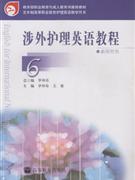-
>
中医入门必背歌诀
-
>
医验集要
-
>
寻回中医失落的元神2:象之篇
-
>
补遗雷公炮制便览 (一函2册)
-
>
人体解剖学常用词图解(精装)
-
>
神医华佗(奇方妙治)
-
>
(精)河南古代医家经验辑
涉外护理英语教程6-(教师用书) 版权信息
- ISBN:9787040229233
- 条形码:9787040229233 ; 978-7-04-022923-3
- 装帧:一般胶版纸
- 册数:暂无
- 重量:暂无
- 所属分类:>>
涉外护理英语教程6-(教师用书) 本书特色
《涉外护理英语教程》教师用书是整个教程的组成部分,主要供使用本教程的教师参考。 教师在使用《涉外护理英语综合教程》时,可根据具体的需要对书的内容进行选择,包括主课文、扩展阅读和各项练习。建议每周4~5学时学习《综合教程》一个单元的内容。
涉外护理英语教程6-(教师用书) 内容简介
《涉外护理英语教程6(教师用书)》主要包括 Keys、Chinese Version等部分的内容。
涉外护理英语教程6-(教师用书) 目录
涉外护理英语教程6-(教师用书) 节选
it E! even
reading
Vocabularu Exercises
I . Fill in the blanks with the words given, changing forms where necessary.
1. rear 2. confer 3. assess 4. wrangling
5. bewildered 6. quoted 7. witness 8. established
Ⅱ. Complete the sentences, putting the Chinese in the brackets into English.
1. a place they would rather visit than inhabit
2. save up for the rainy day
3. There is nothing like a long hot bath
4. spill the beans
5. it is we who tell them so
Ⅲ Get familiar with some common phrasal verbs.
1. to control something and prevent it from increasing
2. to control somebody strictly, oppress somebody
3. to be able not to vomit something after eating or drinking it
4. to not tell somebody something you know
5. to delay progress
6. to hold back
Ⅳ Complete each sentence with the word that seems most suitable.
1. complained 2. protested 3. evasion
4. prudence 5. scholarship 6. allowance
Grammar and Structure
Study the paragraph.
Read the following paragraph carefully, and answer the questions.
1. The author begins by asking a question he wants to discuss; it's an effective way to
arouse readers' interest and focus their attention on what is coming.
2. The author means that discussing money, especially openly, may hurt people's
feelings by causing embarrassment or affecting self-esteem; for example, children
may brag about how much their parents make, thus starting arguments among
them.
3. Soon they would find themselves struggling with a world of evaluations they would
understand no better than we. The riddle of comparable worth would be as
incomprehensible to them as it is to us, but at least we've had years to get used to
the mystery.
4. At least adults have had years to get used to things like that.
5. The usual reason why parents refuse to discuss money matter with their children.
Ⅱ Reconstruct the sentences, following the models given.
1. Were you to make a living as a salesperson, you would never really settle down.
2. Were I to win a million dollars in a lottery, I would donate half of it to local
charities.
3. While she is a likeable person, she can be extremely difficult to work with.
4. While I agree with you, your way of handling the matter is not the best.
furt the r re ading
Review and Practice
I. Explain the underlined parts in your own words.
1. asking more money for their allowance
2. (you) can't buy much with (a particular amount of money)
3. without regard to grades; no matter whether grades are good or not
4. is like...; is similar to
5. bargaining over(discussing, talking about) how much children get at the beginning
1I. Translate the following into Chinese, paying attention to the italicized parts.
Ⅲ. Translate the following into English.
1. Grades should not be equated with abilities, neither should certificates be confused
with practical skills.
2. Giving money as a reward may be convenient, but it's not necessarily healthy for
children.
3. If you pay your child for doing well at school/academically, he may come to expect
a reward for every accomplishment he makes.
4. This movie can be enjoyed by anyone, irrespective of age.
IV. Common Expressions Money
1. throwing his money around
2. got your money's worth
3. in the money
4. have money to burn
1. Money is powerful, and people who have money can get what they want.
2. Money has to be earned, and so should not be wasted.
3. I'm completely sure of that.
4. I'm not rich.
Word-Building Tips
Examples:
1. I get four weeks' holiday allowance. (amount of something that is allowed)
2. The company gives me a travel allowance. (amount of money received regularly)
3. He was punished for tax avoidance. (the act of avoiding tax)
4. Avoidance of danger is essential in such situations. (the act of avoiding danger)
- >
上帝之肋:男人的真实旅程
上帝之肋:男人的真实旅程
¥20.2¥35.0 - >
人文阅读与收藏·良友文学丛书:一天的工作
人文阅读与收藏·良友文学丛书:一天的工作
¥15.7¥45.8 - >
二体千字文
二体千字文
¥14.0¥40.0 - >
经典常谈
经典常谈
¥16.7¥39.8 - >
中国历史的瞬间
中国历史的瞬间
¥16.7¥38.0 - >
回忆爱玛侬
回忆爱玛侬
¥24.0¥32.8 - >
李白与唐代文化
李白与唐代文化
¥9.9¥29.8 - >
大红狗在马戏团-大红狗克里弗-助人
大红狗在马戏团-大红狗克里弗-助人
¥5.2¥10.0
-
方剂学
¥48.4¥79 -
系统解剖学
¥44.4¥79 -
方剂学
¥68.9¥79 -
中医基础理论习题集·全国中医药行业高等教育“十四五”规划教材配套用书
¥76.8¥96 -
中医内科学
¥28.8¥48 -
血液学检验(第5版/高职检验/配增值)
¥45.9¥69
语文教师职后培训模式与效能研究
¥28.2¥80.0日语演讲范文精选-(全二册)
¥18.9¥35.0滚动轴承性能变异的近代统计学分析
¥109.0¥138.0父与子
¥12.3¥29.8可计算一般均衡模型的基本原理与编程
¥25.6¥35.0

















